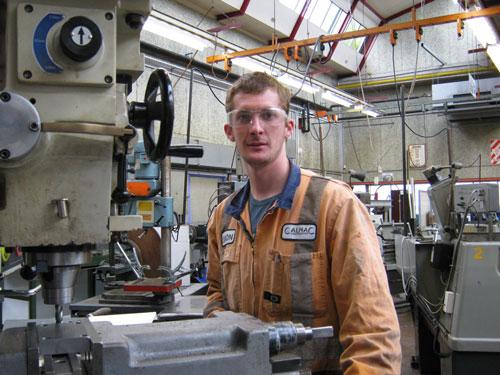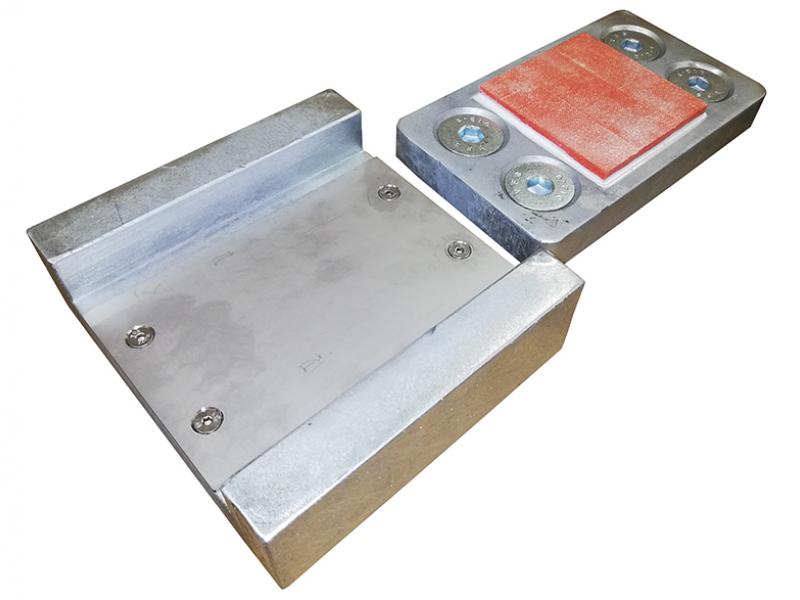Steve Hart reports on how a young apprentice has completed a four-year course in engineering despite being completely deaf
Simon Holt looked like any other student as he operated a milling machine in a training workshop at the Manuka Institute of Technology late last year. And while some of us might say he has achieved great things in completing his engineering training, he would prefer nothing much be made of his accomplishments.
Born profoundly deaf, he was first fitted with a hearing aid when he was 14 months old. But they caused more problems than they were worth, sending loud sounds into his brain. "As I got older I stopped wearing them because they did not help me much, and I did not like the loud noises they made, especially at work – it hurt my head,” he says. Simon has twin sisters who are also deaf, but has a brother who can hear. At home his family mainly use signing to communicate – an official second language in New Zealand. He has been a student at MIT for four years, attending night school and block release courses to complete his studies as part of an apprenticeship with Calmac Engineering in Auckland.
“I completed some courses at MiT evening classes and then Calmac offered me an apprenticeship through Competenz which has worked okay for me,” he says.
“Competenz signed me off, so all I have to do is check I have the right number of credits for my course to be completely finished.”
At the time of writing, Simon was waiting to find out if he had gained a Level 3 Certificate in Maintenance Engineering and a Level 4 Certificate in General Engineering. But he is quietly confident there will be no surprises when the envelope arrives. While other students in his year could listen to what tutors were explaining, Simon needed the help of a ‘signer’ – someone to translate what was being said into sign language for him.
“MiT has been fully supportive of me and I have always been provided with interpreters and note takers for all my evening and block courses,” says Simon. “I think I do okay – open and accepting tutors make things better too.
“I lip read as well. I also think I focus on the job because I can concentrate more, noises do not distract me.
“Overall there has been no real big challenges during my studies – I love the work. But sometimes not having access to an interpreter when required [can cause problems]. But not often, as I have great support at work and from others around me.”
Simon got the idea of becoming an engineer while doing work experience at the Kelston Deaf Education Centre – a residential school that provides services for deaf and hearing impaired children in Auckland, Northland, Waikato and the Bay of Plenty.
“I tried some different jobs, doing woodworking and working at a tyre shop,” he says. “Then I went to Calmac Engineering and really liked it there.
“They were happy to give me some holiday work and I just kept going back until a job came up. An apprenticeship was recommended by the firm after a year or so, and I decided it was a good thing to do. People knew I could do this job, and now I have the qualification to prove it.”
A lot of engineers will say there’s nothing like listening to a machine to know it is working and operating correctly. But Simon overcomes that with his sense of touch.
“Yes, sound does tell you these things but the machine also vibrates when things are not right,” he says. “I can feel the vibrations and know the machine needs to be looked at or checked.
“It is not just sound that tells you something is wrong. I can feel that it is different.”
Personal safety in a workshop is something Simon is well aware of, perhaps more than most – given a warning sound, or a yell from a work mate, will not attract his attention.
“I have health and safety inductions with all personnel at the place I go to work – with a sign language interpreter,” he says. “There is no difference for me being deaf, the rules are the same.
“People are told and can see I need the information differently. But once I am in the workplace people see there are no differences, I work safely and I am always careful and aware of what is around me.”
Simon plans to stay in engineering, but has ambitions to move into leadership, perhaps to mentor or train other young deaf people who want a career in the trade.
“I want to help them know that they can do this work too,” he says.






